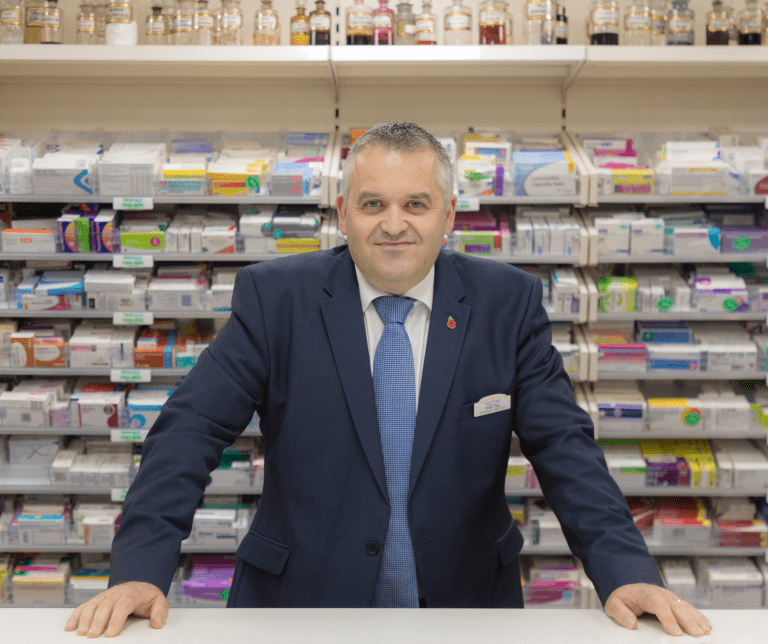The story from the perspective of community pharmacists on the NHS frontline
By Philip Galt, MD and Superintendent Pharmacist, Lindsay & Gilmour.
On 23rd March 2020 lockdown became mandatory.
Coronavirus showed us all how quickly life can change, and this certainly applies to your local pharmacies, which stepped up to do their duty – and more – during the pandemic.
A year on from when the virus hit our shores, pharmacy teams across the country are weary, but proud of their work on the NHS frontline and determined to ‘keep calm and carry on’.
With GP surgeries, opticians and dentists forced to suspend services or provide care remotely, many patients have turned to pharmacy teams for face-to-face help in the community. By November 2020, over a third of people had gone to their pharmacy for advice because their GP was unable to see them face-to-face due to COVID-19 safety measures at the surgery.
As the virus took off, each of our 30 Pharmacy teams across Central Scotland, Fife and The Borders had to juggle ever busier, longer and more stressful days.
At Lindsay & Gilmour, both our online prescription management service and free home delivery service grew in demand exponentially. This, in turn, played a vital role in protecting hospital beds and secondary care resources available for those who were directly affected by COVID-19.
During the peak of the crisis, our prescription volumes were 30% up on previous years (some individual pharmacies saw increases of over 50%) because of concerned patients panic ordering medicines.
We also experienced a huge increase in telephone queries from anxious patients – across our business we saw an increase of over 100,000 inbound calls in March alone.
Demand for our delivery service also increased – with an increase of over 8,500 deliveries in one month.
Perhaps inevitably there was a surge in demand for medicines and the public began to worry about shortages. By and large, pharmacies (and the rest of the supply chain) were able to keep the flow of medicines coming. It relied on people being responsible and only buying the medicines and supplies that they needed at that moment to treat themselves and their families. We also asked patients who take medicines for a long-term medical condition to order repeat medication in plenty of time, to avoid unnecessary delays.
The vast majority of patients were magnificent throughout, and pharmacies were inundated with offers of support from managing queues to delivering medicines. We cannot thank those people enough!
In the early days of the first lockdown, pharmacies had to think quickly about how to manage the flow of patients. This coincided, in Scotland, with the introduction of the new NHS Pharmacy First Scotland service this year. It put community pharmacists centre stage as the first port of call to advise all members of the public on the management of self-limiting illnesses and stable long-term conditions.
At the same time, our teams worked tirelessly to ensure that all aspects of our in-pharmacy environment put the health and wellbeing of our patients and colleagues first with COVID compliant PPE and markings in place in every one of our pharmacies.
The arrival of COVID-19 has also accelerated movement towards many customer centric technologies that could have long term advantages for community care. These include:
The introduction of NHS Near Me, NHS Scotland’s video consulting service which is being trialed in several pharmacies with a view to rolling it out to all Scottish pharmacies soon.
More people than ever are also signing up to free online prescription ordering and delivery services – in our case several thousand over the past few months, making the management of your medicines easier and more efficient.
A year on and, thanks to the vaccines, there is now light at the end of the tunnel.
Success for vaccinations is not only about total numbers receiving jabs, but also the reach into communities, including certain ethnic minority groups. The public has a high level of trust in their local pharmacies and that can be an important factor in overcoming doubts and misapprehensions about COVID-19 vaccines – including within some BAME communities where take-up has been lower.
COVID-19 has underlined the key role pharmacies have as part of the NHS family. Pharmacists have worked closely with other professionals, such as doctors and nurses, to provide the best possible care as part of the local healthcare team.
The pandemic has also shown the importance of having a vibrant network of pharmacies operating close to where people live, work and shop. How on earth would the NHS have coped with the pressure otherwise?
We are delighted at the reaction of the public to our efforts. People recognise that pharmacy teams across the country have stepped up and saved lives. A National Pharmacy Association survey shows that 89% of people believe pharmacies are playing an essential role in the COVID19 crisis.
At Lindsay & Gilmour, we will continue to do our utmost for our patients and communities, who have been through so much and deserve nothing less.


